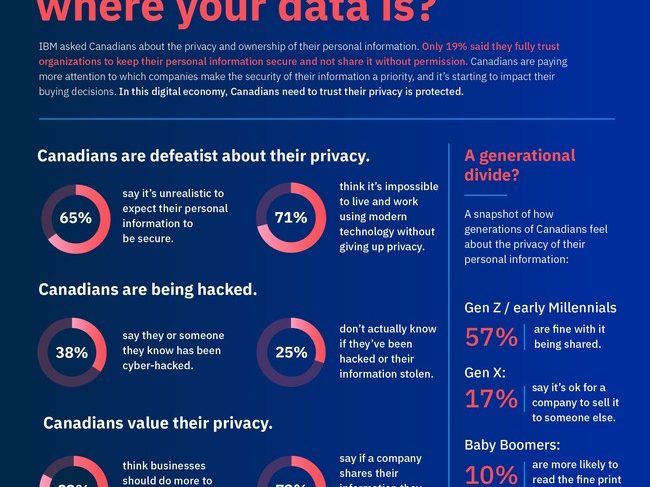
MARKHAM, ON — Canadians are generally defeatist about the security of their personal data, with 65% of respondents to a recent IBM Canada survey saying they feel it’s unrealistic to expect their personal information to be secure. In addition, 71% of Canadians said they feel it is impossible to live and work using modern technology without giving up the privacy of their personal data, according to the survey.
IBM Canada released Wednesday the results of its data ownership and privacy survey, which was conducted online by global research company Morning Consult from November 14 to 16, 2019 among a sample of 2,203 adults in Canada.
According to the survey, 83% of Canadians feel businesses should be doing more to protect consumers against cybersecurity threats where their personal information could be stolen. When asked who holds their personal information, 73% of Canadians admitted they don’t know.
The level of skepticism regarding data security appears quite high among Canadians, with only 19% of survey respondents saying they fully trust businesses to keep their personal information secure and not to share it without permission.
When asked which organizations they trust most with the security and privacy of their personal information when it comes to actions such as storing, sharing and selling, Canadians don’t see much of a difference, according to the survey. Across six categories of business, ranging from health care organizations to social media platforms, results show that trust levels are consistent, mostly within a 5% range. Canadians appear to hold the same levels of trust in ride-sharing apps as they do with banks, the survey reveals.
“We are moving into what is known as a ‘trust economy’,” said Ayman Antoun, president of IBM Canada, in the news release. “Canadians are becoming more aware of which businesses are placing a higher priority on the privacy and security of personal information. Responsible stewardship of data must be at the core of technology innovation and we at IBM are in support of industry, policy-makers and other stakeholders working together to increase trust in the digital economy.”
Cybersecurity fears are having an effect on Canadians’ shopping habits, with many survey respondents indicating they are more hesitant to shop online. Since 38% of Canadians say they or someone they know has been cyber-hacked and 25% admit they don’t actually know if they’ve had their personal data hacked or stolen, it may not seem surprising that this year’s holiday shoppers are more wary, IBM said in its release.
The survey found that, consistently across all age groups, 55% of Canadians are more concerned this year than last about their personal information being compromised while holiday shopping online. Furthermore, 52% of Canadians say they are so concerned about the privacy of their personal information that they are more hesitant to shop online this holiday season.
“Cybercriminals are always looking for ways to take advantage of online consumers and so it is critical for businesses to have security in place that can stay ahead of them to eliminate vulnerabilities or risks,” said Ray Boisvert, an associate partner with IBM Canada Security Services, in the release. “But Canadians also need to stay vigilant and do what they can to keep their data safe. Doing business with a company they trust is a good start.”
Different generations of Canadians have varying views on the privacy of their personal information, according to the survey. As age increases, Canadians become more concerned about how their data is used. Fifty-seven percent of Gen Zers and early Millennials (ages 18 to 29) are fine with companies sharing their information if they tell them about it in advance, while only 44% of Gen Xers (ages 30 to 49) and Baby Boomers (50 and older) feel the same way, according to the survey.
Another differentiator between the generations is that 30% of the Gen Z/early Millennial group is fine with businesses sharing their personal information without telling them, and 29% feel ok with their data being sold to other companies. Fifty-five percent approve of their information being used to develop and improve technologies, the survey says.
Baby boomers are significantly less amenable to losing control of their data — 17% do not want their data shared without their knowledge, and only 13% said they are open to their data being sold. They are also 10% more likely than younger generations to read the fine print to understand how their data could be used, and 10% less likely to buy from a business again — no matter how great their products are — if they share their information without permission, according to the survey.
5 tips from IBM Security to protect your data while shopping online:
- Use credit cards over debit — they offer more protection.
- Use a special ‘shopping’ email address and never use your work email.
- Never save your credit card info — it could put you at risk if the retailer is hacked.
- Use a unique password for each shopping site — again, if the retailer is hacked, your private data could be at risk.
- Don’t click directly on embedded links as this could expose you to malware. Go to the retailer’s website to access deals directly.
[Ed. note: IBM’s release of the results of its data ownership and privacy survey comes the day after Canada’s privacy commissioner tabled the commission’s annual report, which sets out a blueprint for how the country’s federal privacy laws should be updated. Privacy Commissioner Daniel Therrien is calling on Parliament to adopt rights-based privacy laws to better protect Canadians in the face of data-driven technologies creating serious risks for privacy, the Privacy Commission’s news release says.]



